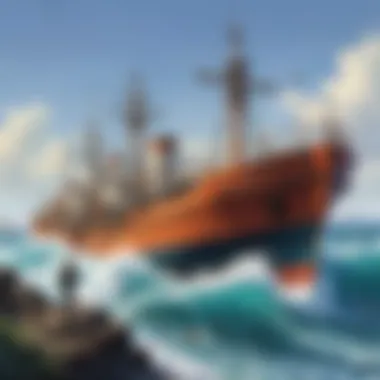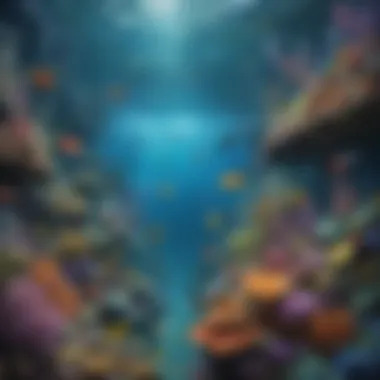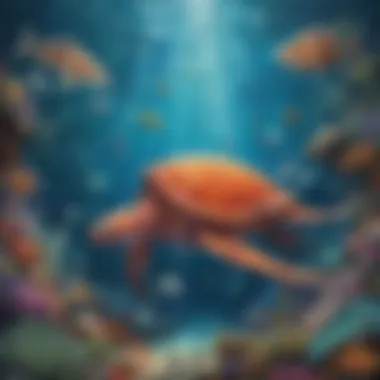Unleashing the Underwater World: Marine Biology Science Fair Projects for Young Minds


Science Fun Facts
Marine biology is a thrilling area of scientific study that unravels the mysteries of ocean life, from the tiniest plankton to the grandest whales. Did you know that the blue whale, Earth's largest animal, can weigh as much as 200 tons?
Discover the Wonders of Science
In the realm of marine biology, young scientists can explore various scientific concepts such as adaptations of sea creatures to their environment, ecosystem dynamics, and even climate change effects on marine life. Educational videos and animations provide a visually stimulating journey into the depths of our oceans, showcasing the diversity and interconnectedness of marine ecosystems.
Science Quiz Time
Are you ready to test your knowledge on marine biology? Engage in interactive quizzes that challenge your understanding of ocean habitats, marine conservation, and the fascinating behaviors of sea creatures. Multiple-choice questions and brain teasers await, offering a fun and educational experience for all curious minds.
Science Experiment Showcase
Embark on exciting science experiments that bring marine biology concepts to life! From creating a mini-ocean ecosystem in a bottle to investigating the effects of pollution on aquatic plants, these hands-on activities provide practical insight into the wonders of the marine world. Follow step-by-step instructions, ensure safety with materials lists and precautions, and let your curiosity guide you through these enriching explorations.
Introduction to Marine Biology
Marine biology opens a realm of endless exploration and discovery for young scientists embarking on science fair projects. Delving into the depths of the ocean unveils a world teeming with unique creatures and intricate ecosystems waiting to be unraveled. By immersing oneself in the study of marine life, young researchers not only expand their scientific knowledge but also cultivate a deep appreciation for the conservation of our oceans. Through hands-on experiments and close observations, budding marine biologists can witness firsthand the interconnectedness of marine organisms and the delicate balance of aquatic environments.
Definition and Importance of Marine Biology
Overview of marine ecosystems
Diving into the realm of marine ecosystems offers a glimpse into the diverse habitats that support a plethora of marine species. From vibrant coral reefs bustling with life to the mysterious depths of the ocean trenches, each ecosystem presents a unique tapestry of biological interactions. Understanding marine ecosystems is crucial as it provides insights into the intricate webs of life that sustain marine organisms and influence global ecosystems. The dynamic nature of these ecosystems presents both challenges and opportunities for young scientists to explore and develop meaningful scientific inquiries.
Significance of studying marine life
Exploring marine life unlocks a treasure trove of knowledge vital for not just scientific curiosity but also environmental stewardship. By studying marine organisms, young researchers can uncover valuable information that contributes to the conservation and sustainable management of marine resources. Understanding the behaviors, adaptations, and ecological roles of marine species helps in elucidating the complex mechanisms that drive marine ecosystems. Overall, studying marine life serves as a cornerstone for fostering environmental awareness and advocating for the preservation of our oceans.
Relevance to Science Fairs


Impactful marine biology projects
Engaging in impactful marine biology projects enhances scientific literacy and fosters a deeper connection to the natural world. By undertaking projects that explore marine issues such as pollution, climate change, or biodiversity, young scientists can contribute meaningfully to ongoing scientific research while addressing real-world challenges. These projects not only stimulate intellectual curiosity but also empower students to become agents of change in their communities by proposing innovative solutions to pressing environmental issues.
Encouraging curiosity about the ocean
Instilling a sense of curiosity about the ocean from a young age shapes inquisitive minds and nurtures a lifelong passion for marine exploration. Science fairs provide a platform for young scientists to delve into the wonders of the ocean, sparking fascination and awe for the mysteries that lie beneath the waves. By encouraging curiosity about the ocean, children develop a sense of environmental responsibility and appreciation for the beauty and complexity of marine ecosystems. This curiosity fuels a desire to delve deeper into marine biology, paving the way for future generations of marine scientists and conservationists.
Choosing a Marine Biology Science Fair Project
In the realm of marine biology science fair projects, selecting the right topic is paramount. This phase serves as the foundation for the entire exploration, guiding young scientists towards a meaningful and insightful journey. By choosing a marine biology project, children not only delve into the depths of oceanic knowledge but also develop crucial scientific skills. The process of selecting a topic includes identifying specific areas of interest within marine biology, ranging from marine habitats to conservation efforts. As youngsters navigate through different marine species, they cultivate a deep appreciation for the diverse life forms within our oceans. This selection process ignites curiosity and drives a passion for understanding and protecting our marine environments, making it a pivotal aspect of this article.
Research and Topic Selection
Identifying areas of interest
One vital aspect of researching and selecting a marine biology science fair project is identifying areas of interest. This phase involves young scientists exploring various aspects of marine life, from the smallest microorganisms to the largest marine mammals. By encouraging children to pinpoint what fascinates them the most about the marine world, they can tailor their projects to align with their curiosity and enthusiasm. This personalized approach not only enhances engagement but also allows them to deepen their understanding of specific marine concepts, nurturing a sense of ownership and passion for their scientific endeavors.
Exploring different marine species
Exploring different marine species is another fundamental step in the research and topic selection process. By studying a variety of marine organisms, children gain insight into the intricate web of life that exists beneath the waves. They learn about the adaptations, behaviors, and ecological roles of different species, broadening their knowledge and appreciation for marine biodiversity. This exploration not only exposes young scientists to the wonders of the ocean but also challenges them to think critically and creatively about conservation and sustainability. Through this diverse exposure, children can develop a well-rounded perspective on marine biology, enriching their science fair projects and overall scientific growth.
Project Ideas and Inspiration
Examining marine habitats
An essential aspect of marine biology science fair projects is examining marine habitats. By focusing on different habitats such as coral reefs, kelp forests, or intertidal zones, young scientists can gain a profound understanding of the unique ecosystems that support marine life. Through hands-on exploration and observation, children can witness the interactions between organisms and their environment, highlighting the delicate balance that sustains these vital ecosystems. This experiential learning not only provides valuable insights into marine biology but also instills a sense of responsibility towards protecting these fragile habitats, making it a compelling choice for science fair projects in this article.
Analyzing marine conservation
Analyzing marine conservation is a crucial component of marine biology science fair projects, emphasizing the significance of environmental stewardship and sustainability. By investigating issues such as pollution, overfishing, or habitat destruction, young scientists can develop innovative solutions to protect marine ecosystems. This aspect of the projects not only raises awareness about pressing environmental challenges but also empowers children to be advocates for marine conservation. Through research and analysis, youngsters can explore how their actions impact the oceans and brainstorm ways to promote conservation efforts within their communities. By engaging with the theme of marine conservation, children can inspire positive change and contribute to the future health of our oceans, making it a pertinent and impactful choice for science fair projects in this article.


Preparing for the Science Fair
As we embark on the journey of preparing for the science fair, it is essential to recognize the pivotal role this phase plays in the culmination of our exploration into marine biology. Preparation is the bedrock upon which successful projects are constructed, laying the groundwork for informed decision-making and meticulous planning. At its core, preparing for the science fair involves a meticulous selection of topics, gathering of resources, and outlining of experimental methodologies. This phase serves as the bridge between ideation and execution, requiring a keen eye for detail and a strategic approach to project management.
Materials and Equipment
Lab supplies needed
Delving into the specifics of lab supplies needed, we encounter a realm of essential tools and resources crucial for conducting experiments in marine biology. From microscopes for observing marine microorganisms to pH meters for analyzing water quality, each tool plays a distinct role in facilitating scientific exploration. The resilience and accuracy of lab supplies needed pave the way for precise data collection and experimentation, ensuring the reliability of scientific findings. Embracing quality lab supplies enhances the credibility of the project and fosters a culture of empirical rigor.
Utilizing technology for data collection
Incorporating technology for data collection introduces a dimension of efficiency and sophistication to the scientific process. Leveraging digital tools and software streamlines data acquisition, analysis, and visualization, empowering young scientists to delve deeper into their research. The integration of technology not only expedites data processing but also cultivates digital literacy, a vital skill in contemporary scientific inquiry. Despite the advantages technology offers, it is imperative to remain cognizant of its limitations and potential biases, ensuring a balanced approach to data interpretation.
Experimental Design
Hypothesis formulation
A cornerstone of scientific inquiry, hypothesis formulation encapsulates the essence of the research question and sets the stage for experimental exploration. Crafting a clear and testable hypothesis enables young scientists to delineate the objectives of their study and predict potential outcomes. The structured approach of hypothesis formulation instills a sense of direction and purpose in the experimentation process, guiding data collection and analysis towards meaningful conclusions. Embracing hypotheses as guiding beacons, young researchers navigate the complexities of marine biology with clarity and intent.
Controlled variables in marine studies
Within the realm of marine studies, controlling variables stands as a fundamental practice essential for accurate and reliable experimentation. By isolating and manipulating variables under controlled conditions, young scientists can discern causal relationships and mitigate external influences on their results. The meticulous control of variables fosters reproducibility and validity in scientific findings, underscoring the importance of methodological precision. Embracing controlled variables as guardians of scientific integrity, young researchers uphold the standards of empirical inquiry and ensure the robustness of their investigations.
Executing the Marine Biology Experiment
When delving into marine biology, executing experiments stands as a pivotal aspect. This juncture entails hands-on involvement and practical application of scientific principles. Young scientists engage in data collection, observation, and analysis during this phase, fostering critical thinking and problem-solving skills. The significance of executing experiments lies in its ability to deepen understanding of marine ecosystems, species interactions, and the impact of human activities on the ocean environment. By immersing themselves in the experimental process, children develop not only scientific knowledge but also a sense of environmental awareness and responsibility. The execution of marine biology experiments nurtures curiosity, fosters a passion for science, and encourages young minds to explore the wonders of the natural world. Children learn to follow scientific methods, accurately record data, and draw meaningful conclusions from their experiments.
Data Collection and Analysis
Recording observations


Recording observations plays a crucial role in the scientific method, allowing young scientists to document their findings accurately. Observations serve as the foundation for analysis, enabling scholars to draw connections, identify patterns, and make inferences about marine life. The meticulous recording of data ensures the credibility and reproducibility of experiments, offering a comprehensive view of ecosystems and species behavior. Engaging in recording observations sharpens observational skills, attention to detail, and scientific accuracy among young learners. This practice instills discipline in data collection, emphasizing the importance of thoroughness and objectivity in scientific research. Despite its challenges, recording observations remains a cornerstone of marine biology projects, fostering a culture of precision and scientific inquiry.
Interpreting experimental results
Interpreting experimental results involves analyzing data collected during the research phase, drawing conclusions, and discussing implications. This critical step allows young scientists to make sense of their findings, identify trends, and communicate their discoveries effectively. Through result interpretation, children develop analytical thinking, logical reasoning, and the ability to draw evidence-based conclusions. By scrutinizing data and deriving meaningful insights, scholars deepen their understanding of marine concepts and hone their scientific communication skills. Interpreting experimental results not only validates the experiment's outcomes but also contributes to the body of scientific knowledge, encouraging further exploration and inquiry. Despite its complexity, result interpretation empowers young scientists to engage thoughtfully with their research, fostering a spirit of discovery and innovation.
Troubleshooting and Iteration
Addressing challenges in the project
In the realm of marine biology projects, challenges are inevitable and provide valuable learning opportunities. Addressing obstacles in the project entails identifying issues, devising solutions, and adapting methodologies to achieve desired outcomes. By confronting challenges head-on, young scientists cultivate resilience, problem-solving skills, and adaptability in the face of setbacks. Tackling project hurdles nurtures a growth mindset, encouraging children to view difficulties as stepping stones to success rather than barriers. This hands-on approach to troubleshooting fosters creativity, perseverance, and a willingness to experiment with new ideas and approaches. Embracing challenges in the project stimulates intellectual curiosity, resourcefulness, and a spirit of scientific exploration among young learners.
Refining methodologies for accuracy
Refining methodologies for accuracy involves optimizing experimental procedures, eliminating sources of error, and ensuring reliable results. This meticulous process improves the precision, reproducibility, and validity of research findings, enhancing the credibility of scientific investigations. By refining methodologies, young scientists learn the importance of procedural integrity, data integrity, and experimental reliability in scientific endeavors. This iterative approach to methodology refinement sharpens analytical skills, attention to detail, and the ability to critically evaluate research protocols. Constantly seeking to improve accuracy fosters a culture of excellence, rigor, and meticulousness in scientific inquiry. Refining methodologies not only enhances the quality of experiments but also cultivates a mindset of continuous improvement and innovation among budding scientists.
Presentation and Conclusion
In the comprehensive realm of marine biology science fair projects, the segment crucially incorporating Presentation and Conclusion stands at the verge of utmost significance. This phase acts as the pinnacle where young aspiring scientists showcase their endeavors and discoveries to a curious audience. Effective presentation skills not only communicate the project's essence clearly but also highlight the meticulous effort invested in the exploration of marine life. It serves as a platform for young minds to articulate their findings objectively and creatively. Additionally, the conclusion phase encapsulates the culmination of the project, emphasizing key learnings and implications derived from the scientific process.
Creating a Science Fair Display
Designing visuals for the project
The pivotal aspect of designing visuals for a marine biology science fair project shapes the narrative of the scientific inquiry. Visual representations, such as diagrams, charts, and images, play a fundamental role in elucidating complex concepts related to marine ecosystems and conservation efforts. These visuals serve as anchors for the audience, aiding in the comprehension of scientific data and observations. By incorporating visually appealing elements, researchers can effectively engage with the viewers and convey the essence of their project succinctly. The strategic placement and design of visuals can significantly enhance the overall appeal and impact of the scientific display.
Communicating findings effectively
The art of communicating findings effectively serves as a cornerstone in the realm of scientific inquiry. It bridges the gap between raw data and meaningful insights, fostering a deeper understanding of marine biology concepts among the audience. Through clear and concise communication, young scientists can convey the significance of their research, methodologies employed, and results obtained. Effective communication not only enriches the scientific discourse but also cultivates crucial skills in presenting complex information in a comprehensible manner. By articulating findings adeptly, researchers can empower others to appreciate the beauty and intricacies of marine life and conservation.
Reflection and Future Implications
Lessons learned from the experience
Reflecting on the scientific journey offers young scientists invaluable lessons that transcend the boundaries of the project itself. It encourages self-assessment, critical thinking, and a deeper appreciation for the scientific method. By dissecting the successes and challenges encountered during the project, researchers can glean crucial insights that contribute to personal and intellectual growth. These lessons serve as guiding beacons for future scientific endeavors, instilling resilience, adaptability, and persistence in the pursuit of knowledge.
Applying marine biology knowledge in the future
The prospect of applying marine biology knowledge in future endeavours heralds a realm of boundless opportunities for budding scientists. It signifies the transition from theoretical understanding to practical application, where acquired knowledge finds real-world relevance. By contextualizing marine biology concepts in everyday scenarios, young researchers can foster a lifelong passion for environmental stewardship and scientific exploration. The application of marine biology knowledge not only enriches scientific acumen but also nurtures a sense of responsibility towards preserving our planet's intricate aquatic ecosystems for generations to come.







